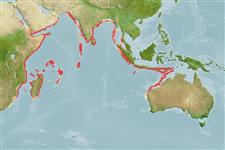Environment: milieu / climate zone / depth range / distribution range
Ekologi
marina djupbottenlevande; djupintervall 179 - 210 m (Ref. 116586). Deep-water
Indian Ocean from East Africa and the Red Sea to the Bay of Bengal; common on the deep shelf from 179 to 210 m.
Size / Vikt / Age
Maturity: Lm ? range ? - ? cm
Max length : 9.0 cm SL hane/ej könsbestämd; (Ref. 116586)
Short description
Bestämningsnycklar | Morfologi | Morfometri
Taggstrålar i ryggfenan (totalt) : 10; Mjukstrålar i ryggfenan (totalt) : 9; Taggstrålar i analfenan: 2; Mjukstrålar i analfenan: 7. This moderately slender-bodied species is distinguished by the following characters: slightly convex dorsal head profile; A II + 7; pectoral-fin rays 14-16, pectoral length 27.1-30.9% SL, reaching anterior edge of anal fin; gill rakers 19-25; pseudobranchial filaments 16-26; first anal-fin pterygiophore long and straight, slender with rather sharp tip and not hollow; palatines and ectopterygoids narrow, usually with 1 row (rarely 2) of denticles; orbital diameter 10.1-12.2% SL; posterior edge of maxillary plate straight; no longitudinal ridges on the preopercular lobe; otolith moderately elongate (OL:OH = 1.5-1.7) (Ref. 116586).
Sold fresh in markets.
Life cycle and mating behavior
Maturities | Reproduktion | Spawnings | Egg(s) | Fecundities | Larver
Schwarzhans, W.W. and A.M. Prokofiev, 2017. Reappraisal of Synagrops, Günther, 1887 with rehabilitation and revision of Parascombrops Alcock, 1889 including description of seven new species and two new genera (Perciformes: Acropomatidae). Zootaxa 4260(1):1-74. (Ref. 116586)
IUCN Red List Status (Ref. 130435)
Threat to humans
Harmless
Human uses
Verktyg
Special reports
Download XML
Internet-källor
Estimates based on models
Phylogenetic diversity index (Ref.
82804): PD
50 = 0.5001 [Uniqueness, from 0.5 = low to 2.0 = high].
Bayesian length-weight: a=0.00955 (0.00424 - 0.02152), b=3.02 (2.82 - 3.22), in cm total length, based on LWR estimates for this (Sub)family-body shape (Ref.
93245).
Trofisk nivå (Ref.
69278): 3.4 ±0.5 se; based on size and trophs of closest relatives
Fishing Vulnerability (Ref.
59153): Low vulnerability (10 of 100).
